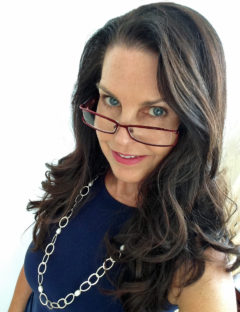 Friday, July 25, 2008
Friday, July 25, 2008
Special to the Daily Sun
Larry Gold stretched his arms wide and reached to the left, mimicking Cindy Thomann, a physical therapist at Flagstaff Medical Center.
“What kind of effort is that on a 1-to-10 basis?” Thomann asked him. “An 8,” Gold answered.
“What can you do to make your movements bigger?” Thomann asked, then watched.
“That’s right, hold your chin up and extend your hand. Catch those raindrops,” she encouraged in a loud, firm voice with a positive bent. “Are you tired or thirsty?”
“Yeah, thirsty,” said Larry and smiled, “but I’ll have to get it.”
This is the point of Think Big, the new program to bring Parkinson’s Disease sufferers back into the world they knew before diagnosis. It’s not the dramatic things that cut the deepest with compromised health; it’s the frustrations they bring to simple pleasures.
Think Big builds confidence through exercises for stability in functional activities. For Gold to stand without falling, stride across a room and pour water into a glass is a hierarchy of tasks. One skill builds upon another, incorporating social and community interaction.
Gold practiced rising and moving forward next.
“Larry needs to be able to stand up and shake people’s hands,” Thomann said.
The lean 90-year old, dressed in black sweatpants and a long-sleeve T-shirt, took a large step, spread his arms and announced, “Ta da!”
Thomann retrains patients to speak louder, use bold movements and interact. Parkinson’s tends to make people shrink and go quiet because they experience a disconnect between intended action and actual performance. In small ways, a stride turns into a shuffle. And too soon, a life is relegated to the couch.
FROM SMALL TO BIG
Think Big focuses on big movements. Throughout 16 sessions, patients perform reaches and gestures whose efforts generate higher drive in arms, legs and trunk.
How does this translate? Performing repetitive gross motor movements retrains sensory perception. Additionally, balance increases. It’s a high-amplitude, high-intensity cardio workout, so Thomann monitors Gold’s heart rate and perceived exertion.
“Their brains see small motions as normal,” she said. “We train them to move in a giant way, which scales back to normal output as a smooth and coordinated movement. At first, they have to think about it. Then, it becomes habit. I cue them, but with time, they self-correct.”
Seniors gain the confidence to stand, cook, exit a car, dress and fold laundry. Think Big is simple, requires no FDA approval and works with drug therapies for cumulative results. It’s also covered by Medicare.
The clinical studies completed last year at University of Arizona took great pains with thoroughness to achieve just such an endorsement. Researchers Valerie Carter and Becky Farley carried the study forward by training physical and occupational therapists as Think Big instructors.
Thomann was accredited in April, about the time Larry Gold was diagnosed with Parkinson’s Disease, although he now realizes his symptoms began five years earlier. A hospital administrator at FMC from 1965 to 1982, Gold stands among the first graduates of the course and will follow up at scheduled intervals.
BUFFALO PARK CHALLENGE
Gold loves hiking and began trekking the Grand Canyon at age 9. Since then, he has traversed the chasm 25 times, taking his last trip at 85. This motivates him in his therapy, so hiking at Buffalo Park became his initial goal.
Before starting out, Gold slid on his wraparound sunglasses and pushed a woven hat with a snazzy band over his white hair. Daily reinforcement of the exercises plus the support of family and friends creates success, so wife Joni walked with him.
Speaking softly, she said, “He’s so much better about getting around the house. I don’t hear, ‘I can’t’ anymore. And he hasn’t fallen since the program. He used to fall five to six times a week.”
“When he forgets (to Think Big), I run a finger down his back, and he straightens up.” said Joni, demonstrating her gentle touch.
Now, Gold ushers at church again, which encourages other older members to stay involved.
Gold’s hat blew off and Thomann made him pick it up. She slapped it on her own head as they moved down the gravel trail. They laughed, and she reminded her hiking partner, “The rocks aren’t a problem if you take big steps. You’re more stable.”
When they rested, Gold said of Thomann, “I can come in (to therapy) down in the dumps, and she takes over. Big makes you feel good.”
Thomann’s theory, “Life moves ahead one big step at a time.”
No known cure, but research is exploding:
Parkinson’s Disease, a motor system disorder, results from a loss of dopamine-producing brain cells. There is no known cause or cure for the progressive, chronic illness generally afflicting those over the age of 50. Former Attorney General Janet Reno, Pope John Paul II and Muhammed Ali joined Michael J. Fox as high-profile sufferers.
There are no definitive tests for PD, so history and a neurological examination form the diagnosis. About 1.5 million Americans are affected while another 3 million display symptoms. These can show up mildly for years before a diagnosis, and there is presently no way to halt or reverse their development. Symptoms include tremors of the jaw, face, legs and arms or stiffness of the limbs and trunk, slowed movement and impaired balance.
Basics such as walking and talking are compromised, and sufferers run the risk of injury from daily activities. Problems with the skin, chewing, swallowing, urination and constipation plus the emotional toll of depression may also follow.
Drugs and surgery are not universally effective, and previous complex physical therapy yielded mixed results. Still, after a static period, research is now exploding and ranges from its cause to treatment and prevention.
For more information on FMC’s Think Big program, call Cindy Thomann at FMC Therapy Services, 773-2125.

